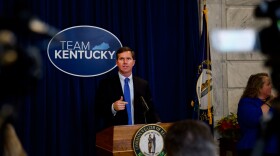Louisville’s three major hospital systems have begun an unprecedented research initiative to screen front-line health care workers in an effort to track the coronavirus and identify plasma that could be used to treat patients infected with COVID-19.
Already, at least 136 health care workers in Louisville have tested positive for the virus, according to information from the health care providers involved: Norton Healthcare, Baptist Healthcare and University of Louisville Health.
U of L’s Chief Medical Officer Jason Smith says hospitals will expand COVID-19 testing both in size and scope among their workers. Besides identifying which of their workers have COVID-19, they're looking for antibodies in the blood that effectively fight the coronavirus. With the right test, the Co-Immunity Project plans to create a pool of recovered patients willing to share their plasma with others fighting COVID-19.
“We want to make sure that we take the pool of patients that has this precious resource, the plasma that may be able to help people, and get it to whatever facility needs it at that time,” Smith said.
Workers Testing Positive
Of the workers who have already tested positive, 89 are at Norton, 32 are at U of L Health and 15 are at Baptist — not a single health care worker employed at the three systems has died, according to information shared with WFPL News.
While a shortage of personal protective equipment (PPE) continues to put workers on the front lines at risk in Kentucky and around the country, a spokeswoman for U of L Health says it has enough protective gear to meet their needs.
One anonymous Norton employee has said the hospital system was not always giving doctors and nurses the equipment they need, but a Norton spokeswoman says they have an adequate supply thanks, in part, to donations.
A Baptist Healthcare spokeswoman says needs change daily, but workers are monitoring usage and are still receiving supplies.
Antibody Testing Is The Next Step
The hospitals will begin testing high-risk health care personnel including those who might be asymptomatic, Smith said. The battery of tests will examine blood type, viral load and immune response in addition to screening for the virus itself.
The University of Louisville’s center for infectious diseases will use an antibody test approved by the U.S. Food and Drug Administration to identify helpful antibodies that fend off the virus, Smith said.
Antibody testing is not a silver bullet, but the study will attempt to answer many of the questions that still surround that virus, he said. For example, there remains limited understanding of how antibodies form in response to the virus; some patients develop a very strong immune response while others don’t, Smith said.
“Is the viral level related to the antibody response? we don’t know that the case yet,” he said.
Baptist Health Chief Medical Officer Dr. Kenneth Anderson says antibody testing is the next step needed to help us address this pandemic
“This is a great opportunity for Baptist Health Louisville to work collaboratively with the Co-Immunity Project and researchers on groundbreaking measures to fight COVID-19,” Anderson said.
Testing Needed To Reopen
Smith with U of L says understanding the virus will be key to reopening the economy. It’s important to learn who may be exposed, who may be immune and who may be a carrier, he said. The ideal would be to create a test similar to what’s used for testing blood sugar. That would be easier to use than what we have currently, Smith said.
With current testing, it’s a bit of a guessing game.
“I don’t think you can underestimate how important testing is going to be for identifying the course of this disease, it’s prevalence within the community and how important that will be to restarting all of the business activities in our daily lives,” Smith said.
The Co-Immunity Project, which also includes the state of Kentucky, has already secured $1.75 million worth of private donations, according to a release. Louisville's three major hospitals systems are also working with the Red Cross to develop the plasma banking once helpful antibodies are identifiable.
“It’s an exciting project that we can hopefully get a lot of information out to not just our institutions, but around the country,” Smith said.






